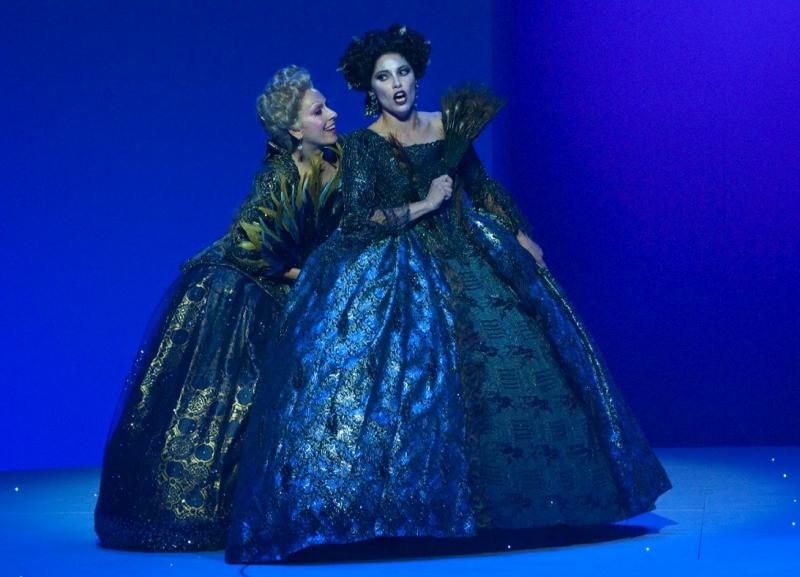


David McVicar's revival production of Handel's oratorio-cum-opera Semele isn't terribly clever or beautiful or impressive, or fecund with ideas or detail or emotion. But it does work. It does tell the story.
Appropriately for a production as deliberately confused in concept as this one - where the characters are neither divine, nor human, nor symbolic, nor Enlightenment but hover somewhere between all possible poles - we start in the fog, albeit a glamorously dry-ice fog. It clears to reveal a scene of complete WAG-like tastefulness. This still, careful, Nineties minimalism - white amphitheatre, chairs, balcony - gives no sense of the turbulence of the opening scenario: the cliffhanger wedding, the horrifically solipsistic bride, Semele, having second thoughts, the wretched lover, Ino, in desperation. Rousset doesn't help by driving Les Talens Lyrique forcefully, straightening every possible curve, cutting short every possible sigh. It was twiddle-your-thumbs time until the entry of Claire Debono's blind Cupid, I'm afraid.
With the emergence of this snaky, sexy, sequenced, Enlightenment glam rocker (pure Peter Greenaway) - whose glistening red tails and bizarre cavorting (not quite hash-induced, not quite cocaine-induced, not quite lost, just weird) mirrored perfectly the slinky bejewelled duplets on oboe and strings that Rousset was conjuring up - and her knowingly stagy, androgynous cabaret performance in dark glasses, the whole production took off. And it repeatedly took off whenever she returned, even when she wasn't singing. The rest of the production - which never went one way or the other, surreal or real, divine or earthly, symbolic or natural - couldn't match up to this inspired idea, which burnt so bright that it consumed all around it.
But it did do enough to facilitate the basics of this cautionary tale on being careful about what you wish for and to project an idea of the lustful characters and the singing. Debono delivered the finest couple of stand-alone arias of the night in her two gem-like exhortations. Richard Croft's Jupiter, a male playing to wife-battering type: horny, self-pitying and violent, dispatched his part expertly. Peter Rose's incredibly solid, fabulously old-school interventions as a stentorian Cadmus and comically sleepy Somnus, reminded one how important a good bass is to the working of a Handel opera - and how rarely we hear one of this calibre.
Danielle de Niese's Semele should have been the star turn. And in many ways she was. In terms of coloratura, control and word-setting, she shone. And her voice is bigger, stronger than I have ever heard it. But one always gets the feeling with De Niese that she thinks she's a better, sexier, more watchable performer than she really is. She's Jessica Rabbit-pretty, for sure, but she's also Jessica Rabbit-subtle too. Flutter, flutter, slinky, slinky. It's like watching a Benny Hill girl at times. And even her voice has its unsubtleties, its pop sensibilities and pop slides. In fact, she goes so much of the way to making a nice sound that many forget how far away she is from making a truly brilliant sound.
When she's singing with Vivica Genaux (Juno and Ino), however, the discrepancy starts to show. Genaux is a very classy act, with a molasses-like voice that sometimes one feels should be harder to shift. And she always does more with less. Jaël Azzaretti was a characterful, springy, amusing sidekick to Genaux's Juno. Stephen Wallace's Athamas, small, timid at first, flourished as things progressed. The choir were stylish and incomprehensible as the French are inclined to be.
Meanwhile, the production trudged on in its cold, abstract furrow, attempting to conjure up some new ritual - neither Greek, nor Enlightenment, nor modern, nor entertaining, but a combination of all - to little effect. And it fell to Cupid once again to save the day, which she did by lolling onto stage in her addled fashion with a pram cradling a bottle of champagne and presenting it to the newly-weds. The evening deserved one too.
Links
[1] https://theartsdesk.com/users/igortoronyilalic
[2] https://www.addtoany.com/share_save
[3] http://www.theartsdesk.com/node/8586
[4] http://www.theatrechampselysees.fr/saison-detail.php?t=1&s=8
[5] http://www.theartsdesk.com/node/767
[6] https://theartsdesk.com/opera
[7] https://theartsdesk.com/topics/handel
[8] https://theartsdesk.com/topics/mythology
[9] https://theartsdesk.com/topics/ancient-greece
[10] https://theartsdesk.com/topics/barbican
[11] https://theartsdesk.com/topics/reviews